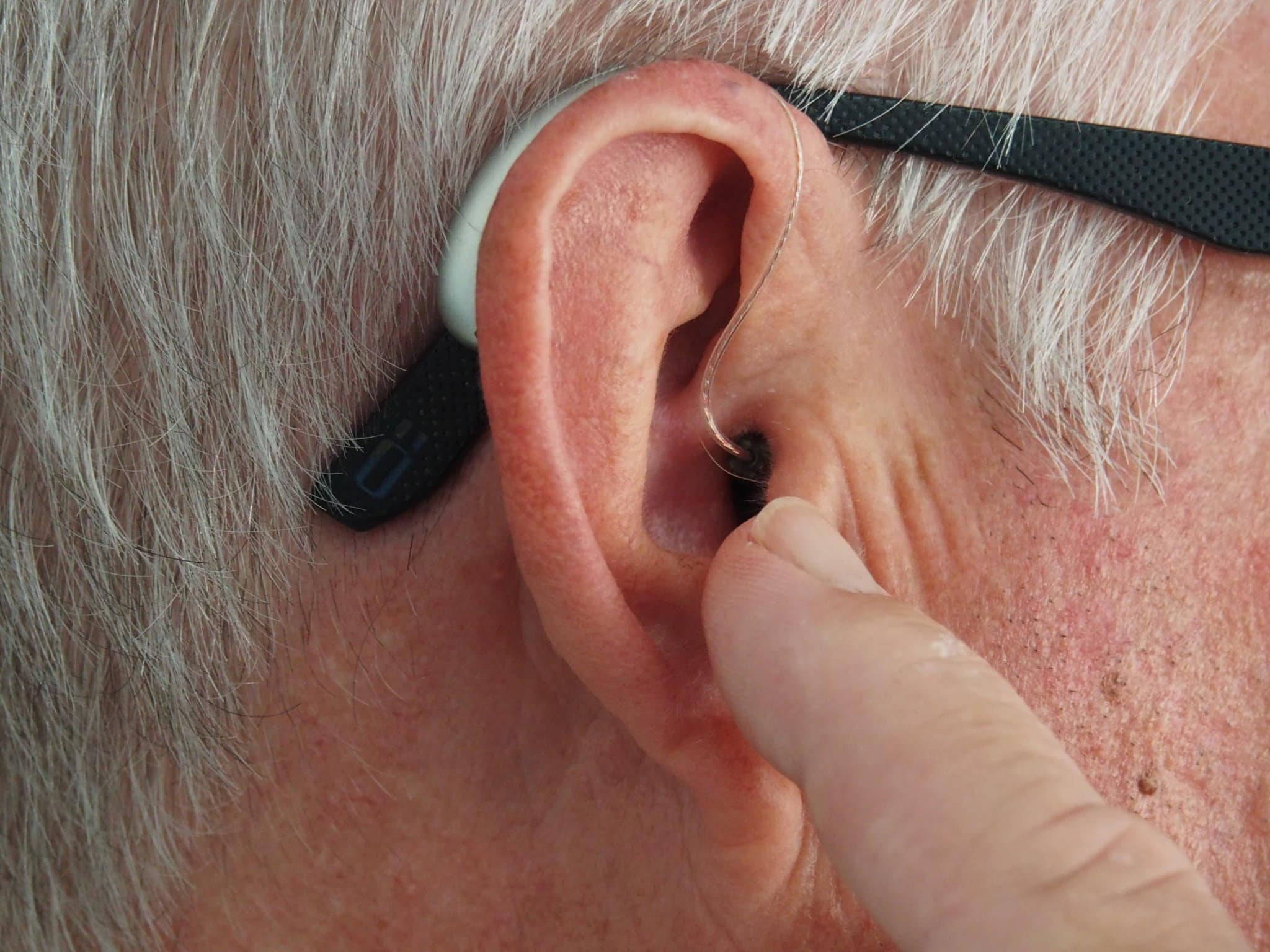On this page, we share trustworthy evidence and resources about hearing conditions and highlight opportunities to take part in research. Our blogs help to set evidence in context and make it easy to understand, and often include reflections from people living with hearing conditions and from health professionals and researchers.
You can either scroll through this page or click on any of the links below to jump to the relevant section:
- Chronic suppurative otitis media
- Dementia and hearing conditions
- Ear drops to remove ear wax
- Grommets (water precautions)
- Hearing loss
- Hyperacusis
- Menière’s disease
- Single-sided deafness
- Tinnitus
1
Chronic suppurative otitis media
Chronic suppurative otitis media (CSOM), also known as chronic otitis media, is an inflammation and infection of the middle ear that lasts for two weeks or more. This blog, aimed at people affected by CSOM, looks at the potential benefits and harms of several treatment options: Chronic suppurative otitis media (infection and inflammation of the middle ear): Cochrane evidence on treatment options (March 2021).
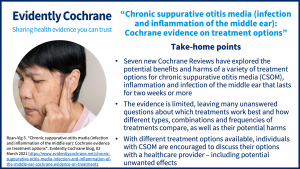
2
Dementia and hearing conditions
The blog Dementia and hearing conditions: what do we most need to know? (March 2023) introduces a new project which aims to find out what are the top questions that need answering about dementia and hearing conditions, in the first Priority Setting Partnership (PSP) to look at two health areas together. Sarah Chapman looks at what this is about, and hears from some of those involved in the PSP about what it hopes to achieve and why it’s important.
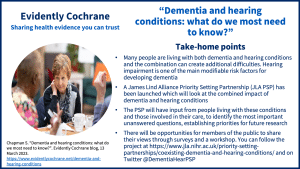
Opportunities to take part in this research
Over the coming months, members of the public will be invited to respond to surveys and to attend a workshop. We will update this page, and the blog, with the details.
3
Ear drops to remove earwax
In this short blog, Ear drops to remove earwax: a quick look (March 2023) Professor Martin Burton looks at the evidence on ear drops for removing earwax, and some things to think about, including whether you need to remove it at all. Professor Burton is an Ear, Nose and Throat doctor and an author of the Cochrane Review on ear drops to remove earwax.
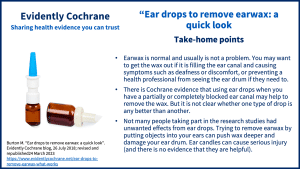
4
Grommets
In Water precautions for children with grommets: is it worth the bother? (February 2016) Professor Martin Burton looks at the evidence on water protection for children with grommets and says it’s time for a fresh look at the advice given to parents.
5
Hearing loss
Hearing aids
In the blog Hearing aids: evidence, equity and rationing (December 2017) Sarah Chapman looks at the evidence on hearing aids for adults with acquired hearing loss.
In the blog Learning to love our hearing aids: the good, the bad, the ugly and the evidence (July 2014, updated August 2016) Sarah Chapman looks at the Cochrane evidence on interventions to improve hearing aid use, and reflects on her own and others’ experiences to consider some of the reasons why people given hearing aids don’t necessarily wear them, and what support is available.
Priorities for research about hearing loss
The blog Hearing loss: priority setting in research (July 2015) is about about a James Lind Alliance Priority Setting Partnership on mild-moderate hearing loss, with reflections from a number of people who were involved. The top priorities identified by that work are explained in the blog Top 10 priorities for research in mild-moderate hearing loss (September 2015).
On this page, you can find details of funded research for priority questions on mild-to-moderate hearing loss.
Opportunities to take part in research on hearing loss
A new tool to help people manage hearing loss
Researchers at Nottingham Biomedical Research Centre want your feedback to help shape a new tool designed to help people manage their hearing loss. You can get involved by:
- sharing your experiences
- trying out the tool
To get involved, please contact Dr Helen Henshaw by email: helen.henshaw@nottingham.ac.uk or on Twitter @hlh1
A trial comparing hearing aids with cochlear implants
In a blog for adults with hearing loss, Severe hearing loss in adults: finding out whether cochlear implants or hearing aids are better (June 2021) Dr Adele Horobin, Patient and Public Involvement and Engagement Manager at the Nottingham Biomedical Research Centre discusses COACH, a new clinical trial aiming to find out if hearing aids or a cochlear implant is better for adults with severe hearing loss.
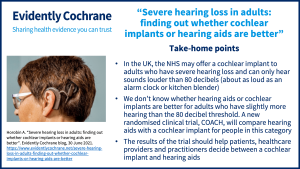
The COACH trial is now recruiting people to take part. Could this be you? Find out more on the COACH Trial website and in this blog Cochlear implant or hearing aids? A clinical trial needs you.
Find clinical trials for hearing loss prevention
Find clinical trials to restore hearing in people with hearing loss
Information and resources on hearing loss
- UK charity RNID has lots of information and support across a range of hearing conditions. It has also recently launched an online hearing checking tool.
- Hearing loss in adults: assessment and management NICE guideline [NG98] Published: 21 June 2018
6
Hyperacusis
In the blog Hyperacusis: what do we most need to know? (December 2017, updated March 2023) members of the JLA Priority Setting Partnership on hyperacusis explain how they worked to ensure research into this hearing problem is directed by those affected by it.
Opportunities to take part in research on hyperacusis
Dr Kathryn Fackrell from the NIHR Nottingham Biomedical Research Centre is leading a new research project. She explains:
“The Development and evaluation of internet Self-Help, Understanding, and Support for Hyperacusis (iSHUSH) project aims to develop and evaluate a high-quality digital educational website that will be designed to provide improved access to information and education on hyperacusis, support, and tools/strategies to self-manage hyperacusis, all aimed towards improvements in hyperacusis-related problems. The project involves a number of steps and studies that will involve adults with lived experience of hyperacusis and healthcare professionals inputting their experiences and challenges of living with hyperacusis and caring for those who do and their views and opinions of the website content and questionnaires that are used for hyperacusis. We are currently aiming to start our next studies at the end of April 2023.
This study will be open for recruitment at the end of April 2023. We will also be looking for adults with hyperacusis to take part an interview and tell us their views and opinions of the content for the iSHUSH website (starting May 2023).”
We will update this page with links to the project website when available and calls to take part.
7
Menière’s disease
In the blog Menière’s disease: experience, evidence gaps & treatment choices (March 2023) Sarah Chapman looks at the latest evidence on treatments and talks to her husband Tim about living with Menière’s and making choices about treatments. She also talks to researcher Katie Webster and Ear, Nose and Throat doctor Martin Burton. Katie and Martin are both authors of new Cochrane Reviews on treatments for Menière’s.
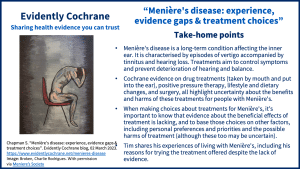
8
Single-sided deafness
In the blog Single-sided deafness: working together to improve research into treatments (March 2022) Roulla Katiri, chief audiologist at the Mater Hospital in Dublin, and Lewis Williams, who developed single-sided deafness in 2018, explain how patients and other experts have worked together to identify the most important things to measure in research studies about treatments for single-sided deafness.
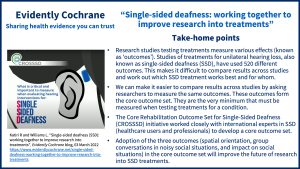
Opportunities to take part in research on single-sided deafness
Further research is currently underway to determine ‘how’ these core outcomes can best be measured. If you would like to take part in future hearing research, please register your interest by signing up to the Nottingham Biomedical Research Centre participant database. You can also email sandra.smith@nottingham.ac.uk for more information.
9
Tinnitus
Cochrane evidence on tinnitus
Between 2016 and 2022, Cochrane Reviews have been published on the following interventions for tinnitus:
Disappointingly, they largely reveal a lack of reliable evidence to inform decisions about these treatments.
Addressing research priorities in tinnitus
The tinnitus top 10 priorities for research were agreed upon in 2012 through the work of the NIHR James Lind Alliance Priority Setting Partnerships. Details of funded research following this can be found here.
Information and resources on tinnitus
- British Tinnitus Association has a variety of resources.
- The British Tinnitus Association has Tinnitus guidance for GPs.
- NICE guideline: Tinnitus: assessment and management.
- NICE: Clinical Knowledge Summary: Tinnitus.
Join in the conversation with @SarahChapman30 @CochraneUK or leave a comment on the blog.
Please note, we cannot give specific medical advice. We do not publish comments that link to individual pages requesting donations or to commercial sites, or appear to endorse commercial products. We welcome diverse views and encourage discussion. However, we ask that comments are respectful. We reserve the right to not publish any we consider offensive. Cochrane UK does not fact check – or endorse – readers’ comments, including any treatments mentioned.
Sarah Chapman and Selena Ryan-Vig have nothing to disclose.

